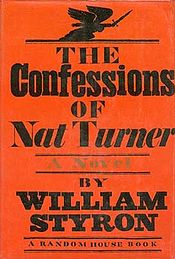- The Confessions of Nat Turner
-
The Confessions of Nat Turner (1st edition) 
First edition coverAuthor(s) William Styron Country United States Language English Genre(s) Novel Publisher Random House Publication date 1967 Media type Print (Hardback & Paperback) Pages 480 ISBN ISBN 0-679-60101-5 (1st ed) OCLC Number 30069097 Dewey Decimal 813/.54 20 LC Classification PS3569.T9 C6 1994 Preceded by Set This House on Fire Followed by Sophie's Choice The Confessions of Nat Turner is a 1967 Pulitzer Prize-winning novel by U.S. writer William Styron. Presented as a first-person narrative by historical figure Nat Turner, the novel concerns the slave revolt in Virginia in 1831. It is based on The Confessions of Nat Turner: The Leader of the Late Insurrection in Southampton, Virginia, a first-hand account of Turner's confessions published by his lawyer, Thomas Ruffin Gray, in 1831.[1]
Contents
Plot introduction
The novel is based on an extant document, the "confession" of Turner to the white lawyer Thomas Gray. In the historical confessions, Turner claims to have been divinely inspired, charged with a mission from God to lead a slave uprising and destroy the white race.
Styron's ambitious novel attempts to imagine the character of Nat Turner; it does not purport to describe accurately or authoritatively the events as they occurred. Some historians consider Gray's account of Turner's "confessions" to be told with prejudice, and recently one writer has alleged that Gray's account is itself a fabrication.[2]
Styron takes liberties with the historical Nat Turner, whose life is otherwise undocumented. The "Confessions" is largely sympathetic to Turner, if not to his thoughts.[citation needed]
Literary significance & criticism
Despite defenses by notable African-American authors Ralph Ellison and James Baldwin, the novel was strongly criticised by some black Americans for its treatment of Turner as a brooding and sexually disturbed figure. Others did not like a white author writing about a black historical figure. Ten black authors wrote essays criticizing the work, collected in William Styron’s Nat Turner: Ten Black Writers Respond (1968).[3] Historian Eugene D. Genovese defended Styron's right to imagine Turner as a fictional character.
Turner and one of his supporters are shown fantasizing about sexually assaulting white women. Critics took issue with Styron using the "myth of the black rapist", as portraying black men as prone to sexual violence against white women. Suspected sexual assault was a longstanding racist stereotype used as rhetorical justification for lynching black men.[4]
Some critics argued that the book explored male sexuality and its manifestations, its development, and how it could often weave with notions of vulnerability, rage, love and power. The protagonist witnesses two acts of rape with pain and disdain. First, as a child, he sees a white overseer raping his mother while their owner, who would not have allowed it, was away. Second, at the start of the revolt, a deranged black man in an act of rage raped and killed a white woman. The protagonist had expressly ordered his followers not to rape women during the rebellion.
Despite protests against the novel, Styron's work won critical acclaim and the Pulitzer Prize for Fiction in 1968. Perhaps its greatest accomplishment is its portrayal of the ways in which slavery corrupted and twisted ideals such as Christianity and innocence.
Time Magazine included the novel in its TIME 100 Best English-language Novels from 1923 to 2005.[5]
Bill Clinton has cited the novel as one of his favorite books.[6]
Criticism
- Clarke, John Henrik, ed. William Styron’s Nat Turner: Ten Black Writers Respond. Boston: Beacon P, 1968.
- Genovese, Eugene D. "The Nat Turner Case", review of William Styron's Nat Turner: Ten Black Writers Respond, ed. John Henrik Clarke, The New York Review of Books, 12 Sept. 1968, Vol. 11, No.4
- Mellard, James M. “This Unquiet Dust: The Problem of History in Styron’s The Confessions of Nat Turner”, Mississippi Quarterly 36.4 (Fall 1983): 525-43.
- Ryan, Tim A. “From Tara to Turner: Slavery and Slave Psychologies in American Fiction and History, 1945-1968”, Calls and Responses: The American Novel of Slavery since Gone with the Wind. Baton Rouge: Louisiana State UP, 2008: 63-113.
References
- ^ The Confessions of Nat Turner, original 1831 publication
- ^ http://www.theroot.com/views/truth-about-nat-turner?page=0,0&wpisrc=root_lightbox The Root Article
- ^ Clarke, John Henrik, ed. William Styron’s Nat Turner: Ten Black Writers Respond. Boston: Beacon P, 1968
- ^ Nell Painter, "Who Was Lynched?", reprinted at Nell Painter, from The Nation, 11 Nov 1991, Vol.253, #16, p. 577
- ^ "100 Best English-language Novels from 1923 to 2005", Time Magazine, accessed 17 Apr 2009
- ^ http://www.cbsnews.com/stories/2003/11/21/politics/main585068.shtml
External links
Categories:- American historical novels
- 1967 novels
- Novels about slavery
- Pulitzer Prize for Fiction
- Novels by William Styron
- 1831 in fiction
- Novels set in Virginia
Wikimedia Foundation. 2010.
